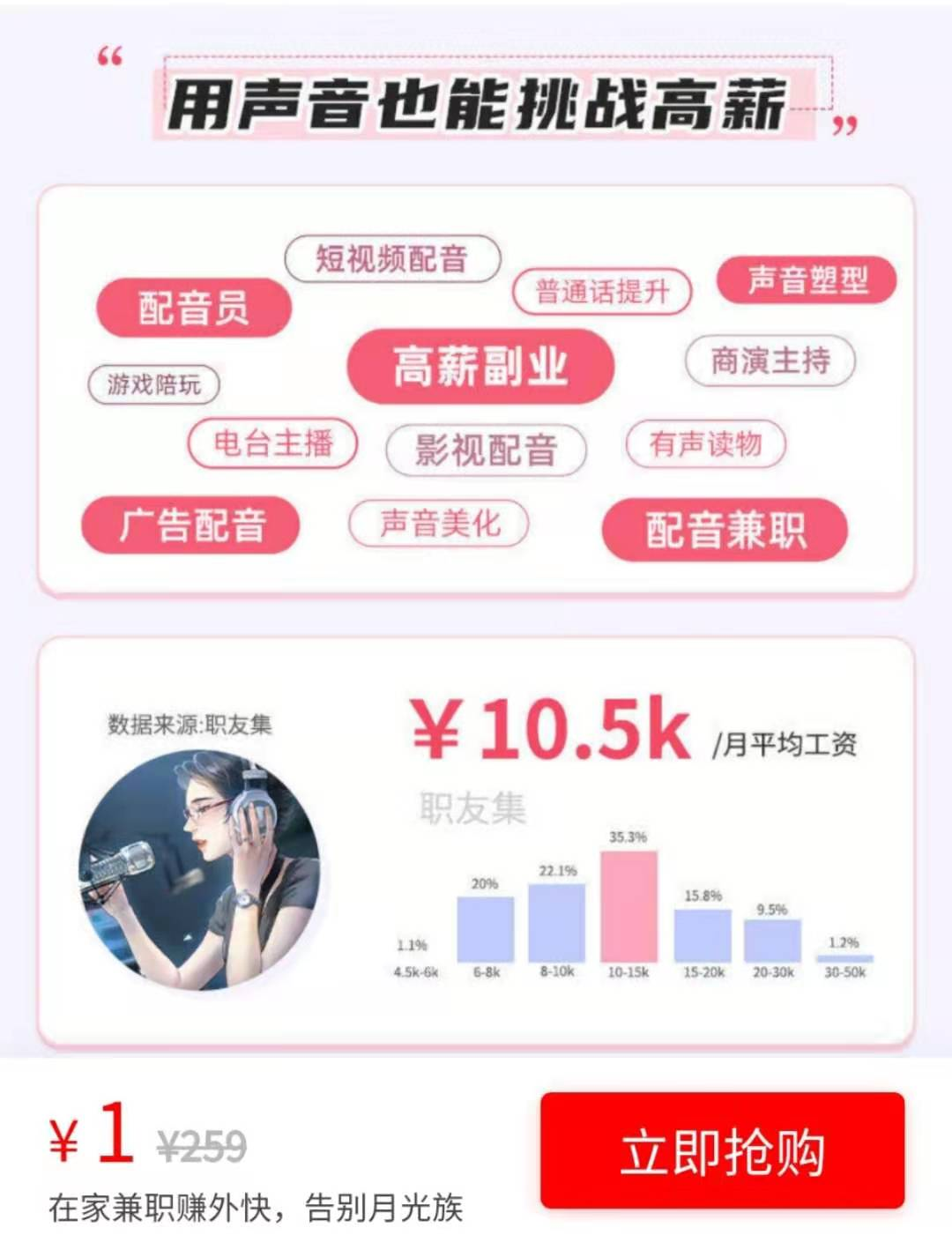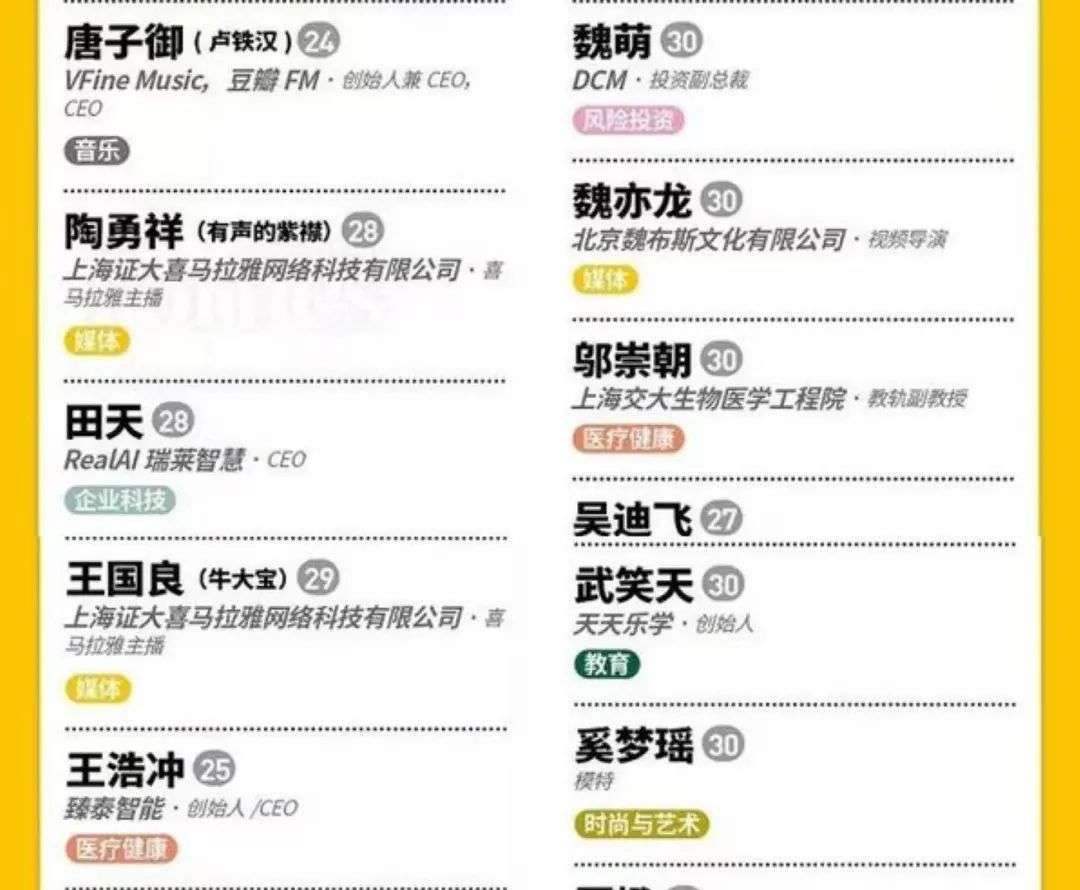Is the dubbing industry really gold everywhere?
Editor’s note: This article is from the WeChat public account “New Domain Lab” (ID: hellolaoban), author: Qi Mengying.
*Xinyu Lab (ID: hellolaoban): Produced by the new media original team of China Business News, focusing on new economic regions, new river basins, and new fields.
Text/Qi Mengying
A room, a pair of headphones, a wheat, and a person. The originally quiet recording room has recently become “noisy”, and the “dubbing circle” is flooding with “gold diggers”.
The national reading survey data released in April shows that in 2020, more than 30% of adults in my country will have the habit of listening to books. Recently, the audio platform Himalaya also submitted a prospectus to the US Securities and Exchange Commission, planning to list on the New York Stock Exchange.
Whether it is Yangchun Baixue or Xia Liba people, the ears of Chinese people have begun to support my country’s fast-developing audio market.
“One month to correct Mandarin, three months to master the breath resonance and emotional change of audio books.” In the promotion of many dubbing training courses, dubbing is described as a skill that can be easily mastered by everyone, and can be Books, live voice broadcasts, official accounts and course recordings, advertisements, film and television dubbing, as well as weddings, commercials, and other methods are realized. Part-time can easily earn more than 10,000 yuan a month, and full-time can be as high as 50,000 to 60,000 yuan.
A dubbing course advertisement (network screenshot)
The forecast of the market size of 50 billion yuan, the “myth of getting rich” by voice anchors, and deceptive admissions are attracting more and more “laymen” who want to rely on their own “a good voice.” Realize the freedom of wealth.
Is the dubbing industry really gold everywhere?
On a dubbing class, how many tens of thousands of dollars can you earn a month?
The “ear economy” maintains a rapid development trend. According to iResearch’s “Research Report on China’s Online Audio Industry in 2020”, the market size of China’s online audio industry will reach 54.31 billion yuan in 2022, with 490 million users in 2019.
Stimulated by the increase in consumption of audio content, the dubbing industry has also become more popular. You can see recruitment advertisements for dubbing training on various social platforms.
27-year-old Zheng Xinxin is an infrastructural accountant, and she is also a fan of “National Dubbing Circle” (domestic voice actor).
Before October 2020, when she saw the online promotion of an educational institution, she was “on the top” and used Huabei to pay nearly 6,000 yuan in a lump sum, and enrolled in two dubbing-related courses. “Many of my people in the same period also signed up for a broadcast host class, which adds up to more than 10,000 yuan.”
Zheng Xinxin’s course payment information (photo provided by the respondent)
After the class started, Zheng Xinxin discovered that it was a recording and broadcasting of the class, and the class teacher gave only a few feedback on the homework after class. In fact, Zheng Xinxin feels that the theories taught by the teacher are not useless. However, her long-term attention to the experience of the dubbing circle and the communication with friends who are engaged in dubbing work convinced her that the dubbing course is purely theoretical and without targeted guidance. She doesn’t make much sense.
Zheng Xinxin does not intend to make money through dubbing. To her, dubbing is more like a pure hobby. The brainwashing propaganda of “dubbing to get rich” by training institutions also deepens her sense of distrust.
So, after studying for more than a week, Zheng Xinxin applied for a refund for the remaining courses. After her persistence, she finally got her remaining tuition after half a month.
However, Zheng Xinxin found that in the learning group, many students are mothers who are leisurely at home. They are convinced of the idea of ”dubbing to get rich”, and many of them still pay tuition through instalment loans.
In the opinion of Zhihu user @自渡鹏鹏, if you want to make money through dubbing part-time, it is better to run online car-hailing to be more stable. Pengpeng worked as a TV host for 3 years after graduating from the major of broadcasting and hosting. He has been in sound training for more than 6 years. He has also participated in the dubbing of radio dramas, audiobooks, feature films and other audio content.
Pengpeng introduced that at present, the remuneration for dubbing work is usually calculated based on the duration of dry voice (unprocessed original recording). “According to the level of 500 yuan per hour of dry sound, you can complete 3 to 4 hours of dry sound recording a day, and you can indeed have 50,000 to 60,000 in a month. However, if you count the time for the preliminary research manuscript and the official recording , One hour of dry sound actually takes one and a half hours or even two hours to complete, and the flat rate is 200~300 yuan/hour.”
It’s also an hour of dry voice, but the salary level spans a huge range. Among the anchors that Pengpeng knows well, only the pole of the headA small number of people can get 500 yuan and above, and the hourly salary of most practitioners will fall in the range of 100 to 200 yuan, and even 10 to 50 yuan are everywhere.
The audiobook producer Tu Huohuo said that when the dubbing staff is unfamiliar with the manuscript and does not understand it well, they will re-record it. “If you really do a part-time job, the invisible time cost is still quite high.”
Pengpeng said, “Perhaps for many people, they are simply not prepared to bear the cost. You can earn 60,000 yuan a month after studying for half a year, and you want to have an ordinary person (one month) to get it. Why is a labor remuneration of several thousand yuan?”
Speaking of these exaggerated admissions essays, Pengpeng speeded up his speech and appeared a little angry. “I have this kind of anxiety. I am very worried that one day others will say that our industry is all scammers, and those who do teaching business are all scammers. This is something I cannot accept because I like my industry very much.”
Sound realization wall
Among the many stories of voice realization, there is no shortage of cases of successful “laymen”.
Among the UGC anchors in the Himalayas with an annual income of one million, Niu Dabao is a two-person actor, and the vocal Zijin was originally a “science man” who majored in computer science. They were on the Forbes China Under 30 Elite List in 2019, the first case of an audio anchor.
The voiced purple lapel and Niu Dabao are listed on the 2019 Forbes China Under 30 Elite List (Picture Source Network)< /p>
Among the various anchors whom Tu Huohuo contacted, many of them were monks halfway through. “Regarding the region, there are relatively more audio studio practitioners in Tianjin, Northeast, and Hebei. Tianjin cross talk is the pride of Tianjin people, and the sketches with northeast accents have always been cordial. There are many friends in Hebei who are engaged in wedding etiquette, and they are more relaxed in front of the microphone. .”
Tu Huohuo said that people with professional backgrounds in broadcasters are more likely to put on airs, and these two groups of people can relax, their language status is more grounded, and sometimes they are more in line with market needs. According to her observations, with the “regional characteristics” with a sense of joy, people from the Northeast often enter the venue, the Northeast accent is more joyful, and the characters with characteristics are easier to have a sense of substitution.
From a layman to a professional, Tu Huohuo feels that on the basis of mastering the rhythm, tone, sentence segmentation and other language skills, after two or three solid projects, plus oneselfThe comprehension of concentration is still very promising to be “seen” among the crowd. However, Tu Huohuo, who has a professional background in broadcasting and hosting, also reminded that speaking and pronunciation is not an easy task. She spent almost all her freshman year on speaking and speaking, and she must practice early every morning after 6 o’clock in the morning. There is never a break in the summer.
“There are a large number of people who know that their foundation is very poor, but they are still ready to enter the industry directly, or want to realize it through some learning, which is very dangerous.” During the training process, Pengpeng found many young people The cognitive ability of oneself is very poor, and learning with the purpose of “realizing”, the mentality of encountering difficulties is easy to collapse.
“The dubbing industry seems to have no threshold, but the threshold of invisibility is very high.” Pengpeng said. “Nowadays there are more and more employees, and the threshold for screening voices is getting higher and higher. There are no requirements for education, age or gender. The final competition is hard work, whether it can reach the professional level.”
Starting from a person’s own hardware, his voice appearance and expressive ability, as well as “software configuration” such as sound aesthetics and literary literacy are huge variables that determine whether he can gain a foothold in the dubbing circle.
Recently, in a talk show, actor Hao Lei talked about the influx of young people who “do not learn well” into the actor’s group, saying bluntly, “How can you read the script without reading?”
Hao Lei doesn’t know how to be an actor in books (network screenshot)
The same goes for the performance-based dubbing industry. In Tu Huohuo’s view, to a certain extent, the literary literacy of voice actors is more important. “The reading comprehension ability is poor, and the sentence segmentation of the manuscript is not good. At the level of audio novels, the dubbing will have a deviation in the understanding of the role, and there are problems with sentence segmentation and semantic logic, and the meaning expressed must be inaccurate or even reverse.”
In addition to the “quality” of the person, the recording equipment is also the right arm of the voice practitioner. The entry of audio novels needs to be equipped with equipment ranging from 3,000 yuan to 5,000 yuan to complete the dubbing of basic character sounds. Recording also has requirements for the room environment, and there must be no noise or reverberation. The professional equipment will reach tens of thousands of yuan. Tu Huohuo said that in some larger projects, the requirements for dubbing equipment and recording environment will also be listed directly when recruiting.
In the current era of major anchors who value personal IP value, in order to realize through voice, in addition to dubbing, they also need project production and operation capabilities. “If you don’t know how the project works, it’s possible that the projectYou finally recorded it. The click rate is low, the playback volume is small, and the completion rate is low, which will compromise the anchors who have invested in high expectations, and it will not be able to play a positive loop value. “Said the rabbit.
Chaos and the future
The sound market, where everyone wants a piece of the pie, is actually still in a state of chaos.
Currently, the core practitioners in the audio industry come from “everywhere”, including broadcasters, actors, and dubbing enthusiasts who are not from a professional class. In fact, the dubbing method of audiobooks, radio dramas and even film and television dramas is closer to the performance system than to the broadcast host. However, many dubbing trainings on the market still follow the system of broadcasting and hosting for course setting and teaching.
Relying on the thriving ACG culture, Japan already has a mature industry chain of voice actors (Japanese voice actors). Nowadays, Japanese voice actors are no longer limited to behind-the-scenes, they also appear on stage, release records, and shoot photos, and have a huge fan base.
According to the data of the Japanese seiyuu career website, seiyuu tamago, there are currently 41 seiyuu training centers in Japan, in addition to seiyuu training centers and specialized schools. Students need to spend 1 to 3 years to learn many types of content such as vocalization, acting, and dance.
From the perspective of talent reserve, there is still no mature training system and path in China. Pengpeng bluntly said that the domestic dubbing profession is relatively weak, and it is difficult for seiyuu schools similar to Japan to become a climate in China.
The project operation process of audio content, in the eyes of Tu Huohuo, who has been in the film and television industry, is different from the more industrialized process of film and television production. The production of audio content is like a primitive “small workshop.” “(With sound) unlike the film and television industry, a project needs to be filed, and then there are a series of processes and procedures, but (with sound) none of these, as long as you have a book, and then pull a team to do it.”
From book review, to audio production, to anchor operation, many times these links are independent of each other, and communication costs are high. Tu Huohuo said that currently there are very few formal companies in China to operate this kind of process from beginning to end.
The challenges facing the voice market don’t stop there. After nearly one or two years of racing, valuable IPs have basically been “exhausted” by major platforms, and it is difficult for small and medium-sized organizations to grab high-quality resources.
Copyright disputes are also a hurdle that audiobooks cannot avoid. Audio platforms such as Himalaya and Lychee fm have been exposed to infringements many times. Recently, “21st Century Business Herald” news revealed that the Chinese Writing Copyright Association is currently collecting complaints from writer members about the infringement of the author’s copyright on the audiobook platform, and it does not rule out the use of class actions to protect the rights of creators.
Tu Huo Huo believes that the current “non-standard” audio market needs more professionals to join in order to further improve the quality of audio content and establish a more complete industrial system. Among them, high-quality and diversified voices are stillneed.
In his work experience, Pengpeng has “persuaded” many people to quit. In his opinion, only those who truly love this business and are willing to contribute to it will eventually stay. “Our industry has too many variables, (income) cannot be quantified, so interest is very important, and determination is very important.”
(Zheng Xinxin and Tu Huohuo are pseudonyms)
(Editor: Huang Yulu Proofreading: Peng Yufeng)



